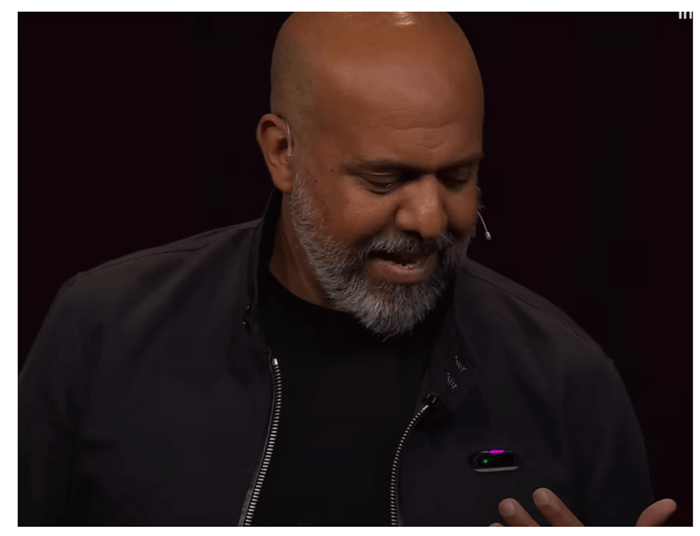Chris’ note: Artificial intelligence (“AI”) is one of the most powerful market megatrends right now. For example, Nvidia, which makes chips for AI systems, is up about 200% this year.
That’s why, here at the Cut, we’re keeping a close eye on developments with AI. And there’s nobody better to bring us those updates than our tech investing expert, Colin Tedards.
He’s a coder-turned-tech-stock-analyst. And he’s on a mission to help you and your fellow Legacy Research readers get up to speed on the latest breakthroughs in AI.
And as you’ll hear from him below, one of the most exciting AI companies right now is called Humane. It’s using this cutting-edge tech to help break screen addictions.
Our addiction to computer screens has its origins nearly a half-century ago…
It started with the Apple II in 1977.
It was the first mass-market desktop computer.
Then, in 1981, the first laptop computer came out – the Epson HX20.
Then in 2007, Apple made another first. It launched the first touchscreen smartphone, the iPhone.
Today, many of us wear touchscreens on our wrists in the form of smartwatches.
For nearly five decades, we’ve watched the evolution of human-computer interface technology evolve.
Now, an AI startup is claiming the next leap in technology won’t be a wearable headset like the Oculus or Apple Vision. It claims the tech won’t have a screen at all.
It’ll be a pin…
Time to Divorce Your Screen?
Humane is a tech startup that believes AI has the power to divorce us from screens.
That’s a bold mission.
It’d be easy to dismiss it outright. But Humane may be onto something big here.
Unlike the current lineup of smart devices, Humane’s pin isn’t another iteration of an old idea. It uses AI to take an innovative approach to wearable devices.
Last May, Humane featured its AI pin during a TED talk.
During the 14-minute presentation, co-founder Imran Chaudhri used the pin to take a call, review emails, and get shopping recommendations.
What was so amazing is that the pin doesn’t have a screen. All you have to do is talk to it.

Humane founder Imran Chaudhri talks to his AI wearable (Source: TED)
It uses AI to understand what you’re saying and follow your commands.
The AI pin is not publicly available yet. But based on the information Humane has released, it’ll be able to use AI to do work tasks like summarize emails and craft a response for you.
Chaudhri was a designer and inventor at Apple for more than 20 years. He worked on the iPad, iPhone, and the iWatch. And he’s named on thousands of patents.
I have to imagine some of his inspiration for a voice-directed AI pin came from Siri, Apple’s digital assistant.
Humane’s AI pin is supposed to take it a step further by learning about you and tailoring even more personalized responses.
Even though it lacks a screen, it can present some visual information. Chaudhri featured the mini-projector by screening a call from his wife during the TED talk.

The mini-projector on Humane’s AI wearable (Source: TED)
A full list of features isn’t available right now. Humane’s next big reveal is on October 14.
But even with just this one demo, what speaks to me about this project is that it holds the potential to make our lives better.
A Little Less Screen Time
As great as smartphones are, they’re feeding an unhealthy addiction to screen time.
The average American spends seven hours a day looking at screens… be that from a TV, laptop, or phone. That’s about 40% of our waking hours.
It’s even worse for younger Americans. Gen Z – people aged between 11 and 26 – spend nine hours a day, on average, looking at a screen.
Much of this time is spent on social media apps such as TikTok, Instagram, and Snapchat.
This isn’t an accident. Facebook, Google, and ByteDance, the creator of TikTok, try to make apps as addictive as possible. Likes, never-ending feeds, and pinging notifications keep your eyes on the screen.
And this isn’t just me saying this. In 2017, the founding president of Facebook, Sean Parker, said:
[Facebook functions by] exploiting a vulnerability in human psychology… God only knows what it’s doing to our children’s brains.
The more time you spend on their apps, the more ads they can serve you, and the more money they can make.
The AI pin offers an alternative.
It allows us to stay connected online and harness the power of AI. But it gives us the chance to be face-to-face with loved ones, co-workers, and friends.
It also offers us the chance to lift our heads 45 degrees away from our phones for a few hours more a day.
We have a decision to make with AI. We can use it to further our addiction to screen time. Or we can use it to emancipate us.
Don’t get me wrong: We’re not going to eliminate screens altogether. Most white-collar jobs require a screen.
A pin – no matter how smart – isn’t going to replace that. But if we can take back some of that screen time during non-working hours, I’d consider that a big win.
Humane, the company behind the AI pin, isn’t publicly traded. It raised $100 million last March from Microsoft, Salesforce, and Sam Altman, the CEO of OpenAI, among others.
That put it at an $850 million market valuation.
That’s incredibly rich for a company that hasn’t shipped a single device yet. But its innovative tech and AI-heavy backers tell me that Humane is going to be a company we will hear more of in the future.
Regards,
Colin Tedards
Editor, The Bleeding Edge